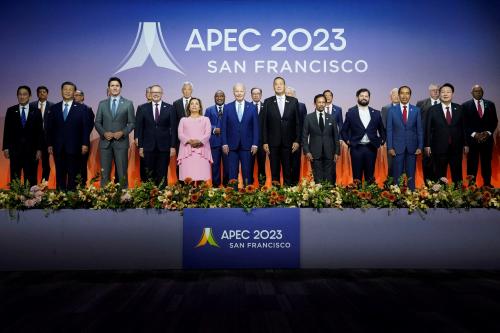It is no secret that the Bush administration’s basic idea behind the Annapolis peace process is not so much to push for a peace agreement between Palestinians and Israelis but to gather the pro-US Arab states under the aegis of a peace process for the purpose of containing or at least balancing the rising power of Iran. While President Bush would very much like to be remembered as the American president who sponsored a solution to the seemingly eternal Israeli-Palestinian conflict in his last year in office, his priority and more urgent goal is however to prevent the mullahs of Iran from producing an atomic bomb and becoming the region’s bully.
By inviting the Syrians and including the issue of the Golan Heights on the conference agenda, some in Washington also hoped they could start a process that would aim at decoupling Damascus from Tehran, an outcome that could help Israel neutralize the military threats it is facing from Hizb’allah and Hamas.
But unless Bush and Israeli Prime Minister Ehud Olmert are prepared for a new approach toward Damascus, partial measures and half steps will most probably draw Syria closer to Iran and convince it to stick to its role of peace spoiler whether between Israelis and Palestinians or between Israelis and Lebanese. History and pragmatic Syrian and Iranian statecraft suggest that the Syrian-Iranian alliance will outlive Annapolis and its aftermath.
Taking Syria away from the Iranian orbit is sound policy for obvious reasons that have been laid out by various officials in Washington and Arab capitals, but it is worth remembering why past attempts have failed and why this current one will most likely yield no different results. Throughout the 1980s, Americans and Arabs tried hard to convince Hafez Assad to break with Khomeini’s Iran. At the time, Assad had valid reasons to abandon his alliance with the Iranians: secure his country’s eastern flank with Iraq because of the prospect of a conflict with Israel; put an end to Syria’s marginalization in Arab politics with the consolidation of the Egyptian-Jordanian-Iraqi axis; Iranian activity and interference in Lebanon via Hizb’allah which threatened vital Syrian interests in that country; and finally Khomeini’s decision to stop delivering oil to Syria which severely impacted on the Syrian economy.
Despite all these reasons and the strenuous efforts by King Hussein’s Jordan, King Fahd’s Saudi Arabia, and Mubarak’s Egypt in summer 1987 to put considerable pressure on Syria to sever its links with Iran and mend fences with Iraq, Assad did not leave his Iranian friends in the cold. Assad was a strategic thinker. He understood that realignment with Iraq would do little to mitigate his country’s security concerns or further its regional interests. Iran and Syria obviously did not see eye to eye on all issues that concerned them, but they agreed on the most critical: US deployment in the Gulf threatened the two nations’ strategic interests. That was enough reason for them to firm up their alliance.
Today, there is no doubt that the Middle East’s strategic map is different. Also, Hafez Assad is gone and Bashar Assad, his young, ill-experienced and risk-taking son is in power. Nevertheless, the United States remains present in the Middle East, having become more involved than ever with its occupation of Iraq and its active promotion of a poorly designed democratization strategy, both of which unnerved pro-US Arab leaders. Today, US and Israeli policies and actions in the region are once again perceived by Iran and Syria as threatening to their national security. Both have seen their nuclear designs targeted, and reportedly set back by American pressure and Israeli airpower respectively. This is enough reason for them to shore up their alliance.
A peace deal between Syria and Israel is achievable, but it will require meaningful concessions and a win-win mentality from both nations. Israel will have to withdraw to the 1967 borders, including the northeast shore of Lake Tiberius. Syria will have to provide Israel with credible security guarantees starting with an agreement, which Hafez Assad agreed to in Shepherdstown and Geneva in 2000, on large demilitarized zones on both sides of the border. Fearing that giving up the Golan would undermine their own security, Israelis will be asking Washington (as they did in 2000) for a security package deal worth approximately $20 billion, if not more. Washington’s role will therefore be not limited to brokering a Syrian-Israeli peace agreement but also financing it.
In 2000, the Syrians believed (and still do) at Shepherdstown that the Israelis were in no position to impose conditions on them – breaking with Iran – to make peace and that withdrawal from the Golan was a legitimate right accorded to them by the United Nations’ Security Council Resolution 242. Territorial sovereignty, for the Syrians, is a non-negotiable right. There was always room for cooperation and compromise when it came to Lebanon and the Palestinians, but as far as Syria’s right to have good relations with Iran was concerned, the Israelis, as Syrian foreign minister Faruq al Shara’ (now deputy president) kept insisting, were going too far. Today, when Israeli Prime Minister Ehud Olmert says that Syria “knows what to do” in order for the two nations to make peace, it is code word for Syria abandoning Iran and cutting its ties to Hizb’allah and Hamas. Syria might consider the latter but would find no reason to compromise on the former.
The Syrian-Iranian alliance, solid since the Iranian revolution in 1979, is not and has never been perfect. Its fault lines are considerable – especially in post-Saddam Iraq and post-Syria Lebanon – but the two nations’ ability to withstand serious setbacks, make periodic reviews of their relationship, and most importantly not compromise on issues involving national security proved that the Syrian-Iranian nexus is more than a marriage of convenience; it has indeed become a mature and institutionalized alliance which is not likely to be broken by virtual carrots and empty promises by Washington and now Moscow. Peace between Syria and Israel, if and when it happens, will most likely redefine the parameters of the Syrian-Iranian alliance but will not lead to its demise. Not bad as an end result.



Commentary
Op-edThe Future of the Syrian-Iranian Alliance
December 21, 2007